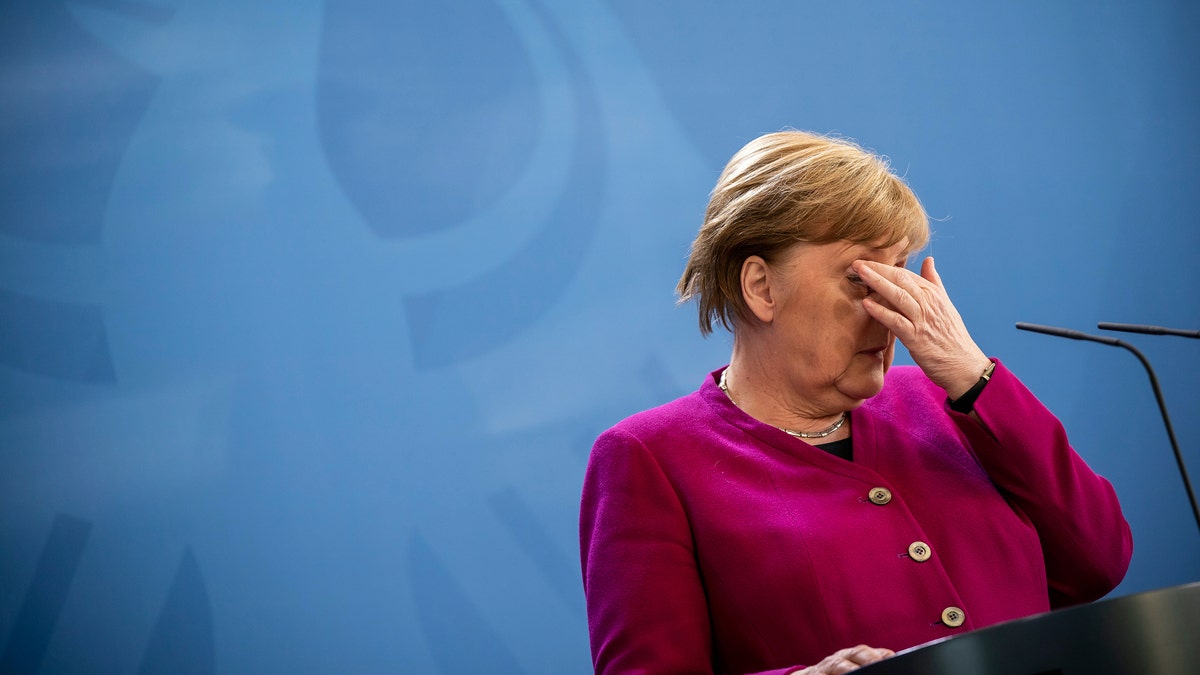Angela Merkel rebuffed an attempted handshake with Germany interior minister
German Chancellor Angela Merkel attempted handshake get rebuffed at meeting after the country had an influx of people diagnosed with the coronavirus.
Get all the latest news on coronavirus and more delivered daily to your inbox. Sign up here.
Germany, one of the first European countries to cautiously loosen its coronavirus lockdown, is now facing the bleak prospect of having to restore the measures following a slight uptick in new infections.
Earlier this month, the country took its first step to gradually restart public life as the propagation rate of the virus fell.

In this March 24, 2020, file photo, a man jogs on the square in front of the Brandenburg Gate in Berlin, Germany. As the restrictions are eased, Chancellor Angela Merkel has pointed to South Korea as an example of how Germany will have to improve measures to “get ahead” of the pandemic with more testing and tracking of cases so that the rate of infections can be slowed. (AP)
Small retailers with a surface area of up to 8,600 square feet, car and bicycle dealerships, as well as bookstores, were allowed to reopen while keeping social distancing in place. Next week, some students are expected to return to school.
All states are also moving ahead with regulations requiring protective masks in public transport, shops, or both.
CLICK HERE FOR FULL CORONAVIRUS COVERAGE
But on Monday, the Robert Koch Institute revealed Germany had seen the first daily uptick in new cases in more than three days. It said the reproduction or infection rate had risen again to approximately 1.0, meaning each infected person passes the virus on to one other person.
When Germany, which was widely praised for its response to the pandemic, decided to lift some restrictions, the infection rate had fallen to 0.7.

A woman wears a face mask with a world map design as the attends a protest of travel agents in Kiel, Germany, Wednesday, Aril 29, 2020. Representatives of tour operators and travel agencies demonstrated in front of the Kiel state parliament to draw attention to their difficult economic situation during the coronavirus crisis. (dpa via AP)
Virologists have insisted the infection rate must stay below 1.0 in order to keep the pandemic manageable.
“The number should stay below one, that is the big goal,” Lothar Wieler, head of the Robert Koch Institute, said at a news conference, according to Sky News. “The further it is below one, the more secure we can feel, the more leeway we have, but there are other numbers that are also important.”
CORONAVIRUS LOCKDOWN: WHICH EUROPEAN COUNTRIES ARE EASING RESTRICTIONS?
The latest figures show Germany has seen more than 160,000 positive COVID-19 cases and at least 6,314 deaths – putting it among the hardest-hit countries worldwide.
Officials told Sky News that while it was too early to say whether easing the restrictions caused the newest increase, they are monitoring closely.

German Chancellor Angela Merkel attends a press conference following the European Council video conference on 23 April 2020. (dpa)
With the now less than encouraging data, Chancellor Angela Merkel is set to discuss the next steps for easing lockdown restrictions on Thursday. The next day for further easing of restrictions had been expected on May 6.
Merkel has warned Germany’s federal states against loosening their lockdowns too quickly, saying the pandemic was “still at the beginning.”
Last week she cautioned that, while the rate of new infections has been slowing, “we’re still walking on thin ice, one could also say the thinnest ice.”
“We’re not living in the final phase of the pandemic, but still at the beginning. We will be living with this virus for a long time.”
She added: “Let us not squander what we have achieved and risk a setback. It would be a shame if premature hope ultimately punishes us all. Let us all stay on the path in the next phase of the pandemic: smart and careful. It’s a long journey; we can’t run out of stamina and air too soon.”
CLICK HERE FOR THE FOX NEWS APP
Meanwhile, Germany announced Wednesday it was extending its worldwide travel warning until mid-June, saying the pandemic is too dire to change the guidance.

German Foreign Minister Heiko Maas announces the extension of the worldwide travel warning of the government in due to the coronavirus outbreak in front of the Foreign Ministry in Berlin, Germany. Wednesday, April 29, 2020. The worldwide travel warning will initially last until 14 June 2020. (dpa via AP)
Foreign Minister Heiko Maas said the warning, due to expire May 3, would be extended to June 14 because there has been no change to the danger posed by the pandemic.
“Naturally, we all hope we won’t need this travel warning after June 14,” Maas said.
The travel warning means Germans who booked vacations for the dates can get refunds, another likely blow to the European travel industry.
The Associated Press contributed to this report.








































